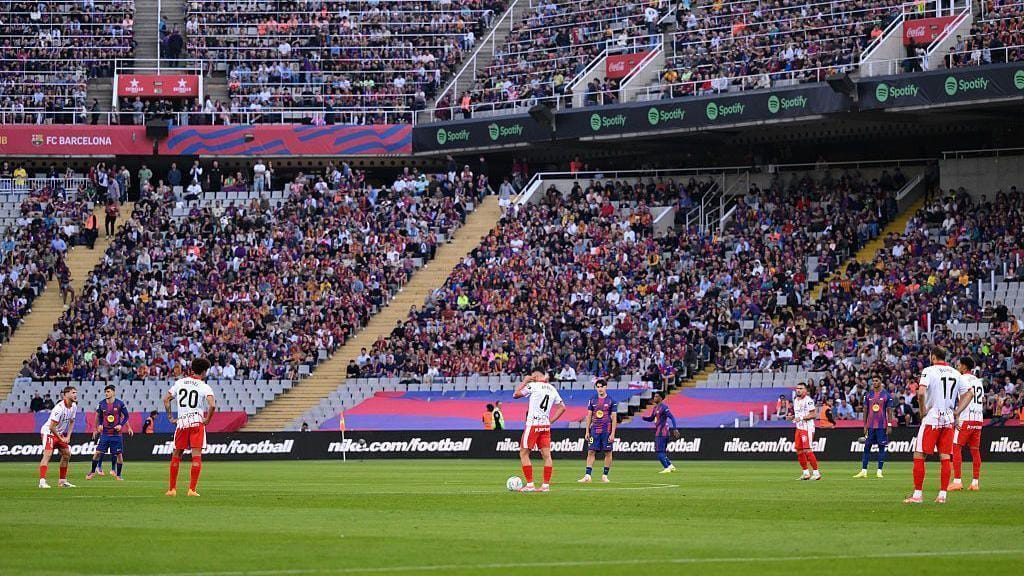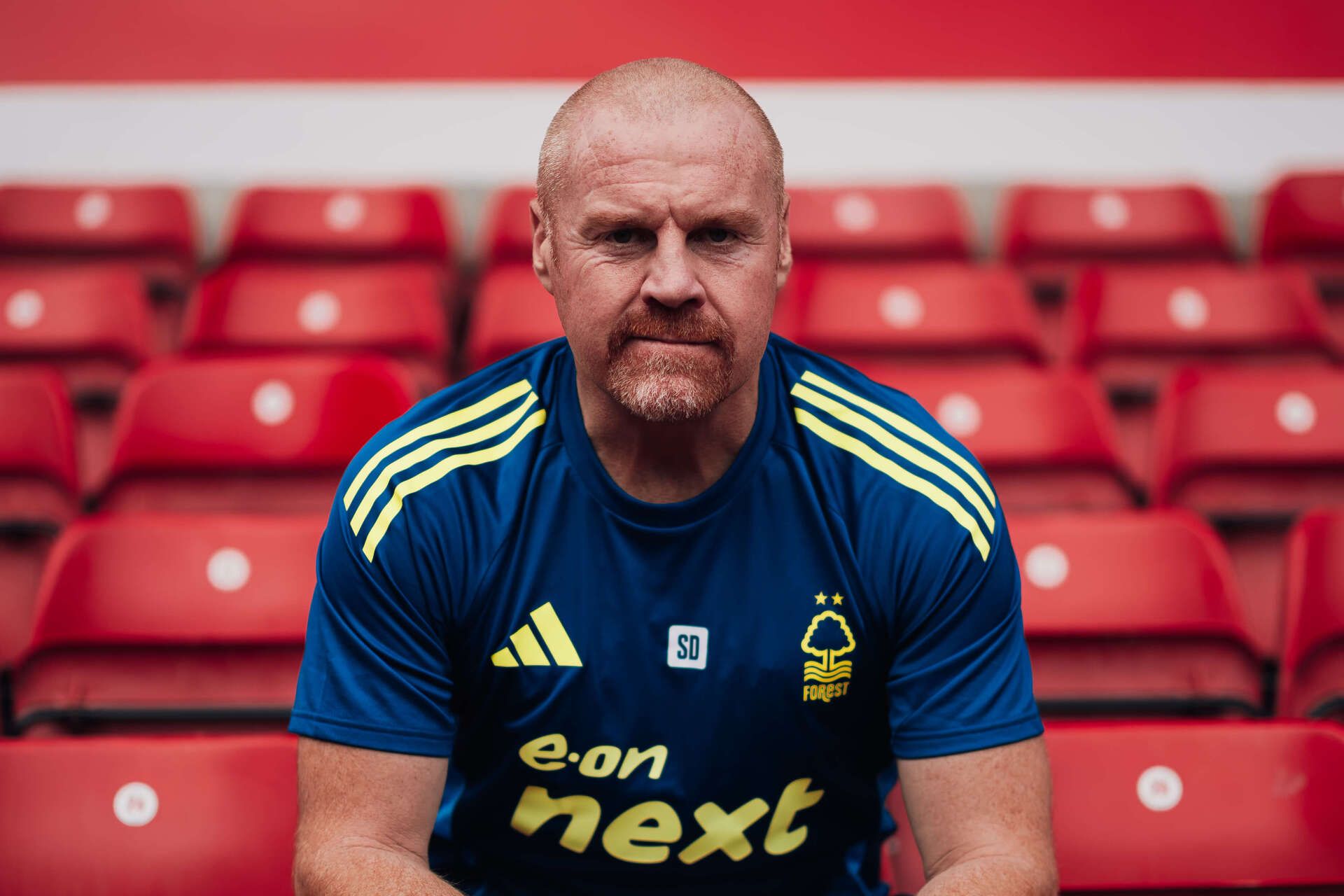Greetings from Yorkshire!
I’m writing a couple of days after the Champions League let itself down a little. Europe’s showpiece competition is supposed to be dignified, prestigious, refined. On Tuesday, it came over all giddy, producing a host of games that – when taken together – felt fundamentally unserious: PSG scored seven, Barcelona and PSV scored six, Arsenal, Inter and Borussia Dortmund all scored four.
Wednesday was not quite as prolific, but its 28 goals made this the highest-scoring matchweek in the competition’s history. Admittedly that is a slightly meaningless statistic, because the new model means there are more games every week now, but still.
It would be churlish to complain too much about that, of course: there is nothing wrong with a little fun. And besides, it is much too early to assume it is indicative of some greater truth. (Which is annoying for a newsletter based on the idea that everything is indicative of some greater truth.)
But still: Tuesday night made for engaging content, but after a while all of those goals felt a little like empty calories. As the shots rained down and the numbers ticked up in Leverkusen and Copenhagen and then Frankfurt, it did not feel like the Champions League at its best. A competition that is built around exclusivity and quality should not, really, be producing this many blowouts.
MiB HQ Bulletin Board 📢
A digital pub. A second screen of joy. Come chat during the games.
Standing Still to Be Heard 🇪🇸

The plan to stage a single La Liga game in the United States had been at least seven years in the making. It was as far back as 2018 that Spain’s top flight signed a deal with the entertainment group Relevent with the express aim of taking “a regular season club match to the United States, the first to be played outside of Europe,” as the press material put it at the time.
That was, of course, just the start. The road between that announcement and the declaration, earlier this month, that Villarreal’s game against Barcelona would be played in Miami in December was a long and winding one. There had been several false starts: La Liga had originally earmarked a game between Barcelona and Girona as its preferred option, in 2019, but had been forced to cancel that one, too. Schemes involving various combinations of Barcelona, Villarreal and Atlético Madrid had gone the same way.
And then there was the cost, both in time and money, of trying to get the idea off the ground. There was stringent opposition at basically every turn. FIFA did not approve. The Spanish federation did not approve. UEFA did not approve. U.S. Soccer did not approve.
Overcoming that was slow and expensive, an exercise in lawsuits and lobbying and logistics that finally culminated with UEFA, a little reluctantly, agreeing to the proposal in the first week of October. Within both La Liga and Relevent, there must have been considerable relief. Whether you like the proposal or not, it is hard to deny the indefatigability required to bring the idea to fruition.
There was a reason for that: as Javier Tebas, La Liga’s wallflower of a president, has repeatedly said, staging a game in the U.S. is vital for the competition’s long-term financial health. It is, as far as he is concerned, a central part of La Liga’s future, the only way Spanish soccer can hope to keep pace – let alone close the gap – with the Premier League.
It is worth stressing both the importance of that single game, and the extent to which La Liga and Relevent went to make it happen, in light of what happened this week. This was not a whim. It was not a passing fancy. One of the world’s biggest leagues, and one of the world’s most powerful entertainment groups, had all of their considerable weight behind it.
And all it took to bring it all to a grinding halt was 15 seconds of nothing.
No sooner had the plan been announced than La Liga’s players started objecting to it. Frenkie de Jong, the Barcelona midfielder, said it was “not good for the players,” noting an already packed schedule and the heightened risk of fatigue. Several of his colleagues at Real Madrid – a club that exists in a state of open war with La Liga at all times – echoed those views. Thibaut Courtois, the goalkeeper, insisted it would “affect the integrity of the competition.”
Those comments were doubtless embarrassing for La Liga – and Relevent – but they did not prove nearly as potent as saying, and doing, nothing at all. Last weekend, Spanish football’s players’ union organized a protest of eloquent simplicity: for the first 15 seconds of each of the competition’s 10 games, the players would do nothing. They would simply stand still on the field. The message, expressed perfectly, was simple: without us, none of this happens.
Initially, La Liga tried to style it out. Rather than focus on what was (not) happening on the field, the league’s cameras cut to wide shots of stadiums – “filming some birds on the roof,” as the Espanyol captain Leandro Cabrera put it – as they waited for the protest to pass.
Quickly, though, it became clear that pretending nothing was happening was not an option. On Tuesday, the opening of a pre-sale ticket window was delayed. And on Wednesday, Relevent released a statement announcing that the game would be cancelled. It was, the group said, not possible to stage an event of such magnitude given the uncertainty around whether it would happen or not.
There were, as ESPN has reported, other factors: the possibility of a legal challenge from Real Madrid or of an objection from Spain’s Sports Ministry. The timing, though, made it difficult to ignore the feeling that it was the players, the collective action, that had made the difference.

There is a lesson here. Europe’s footballers do not exert their influence quite as effectively as in the major American sports. There have, in recent years, been strikes or lockouts in all of the major American sports over various issues. They might not always work – and they might not always be over issues you personally agree with – but they do, as a rule, have a voice. They are an active stakeholder in their product, to use the jargon.
That has never really been an option in soccer. The players will sometimes come together for a cause they believe in, such as taking the knee in the aftermath of the Black Lives Matter moment. There are players’ unions, both national and international, that lobby for their interests, with occasional success. But for the most part, the people most responsible for providing the most popular form of entertainment on the planet have not been given much of a say in how their industry operates.
There are reasons for that, none of them especially easy to overcome: soccer, unlike the U.S. sports, is not a self-contained league; its globality means that the interests or concerns of one group of players do not necessarily align with those of another; the money on offer, the fluidity of the transfer market and the ruthless competition underpinning it all means that anyone considering strike action risks being replaced. The clubs repealed the minimum wage in 1961. As far as they are concerned, they’ve done their bit.
The protest in Spain – and the success it has had – should serve as both a reminder and a watershed. It is proof that soccer should not take its players for granted, that the clubs and leagues and federations that run it should have the common decency to listen to their complaints and their concerns. The whole edifice, after all, does rest on them.
And it should act as a symbol to the players that if they do stand together, if they do take action, then they do have power. It is widely accepted that the various organizations who run the game are asking too much of the people who play it, demanding they perform more and more, risking their health and as a consequence their earning potential.
It is not easy for the players to stand up to that. They will not, often, get the sympathy they might from the fans. But, together, they do have the ability and the wherewithal to represent their own interests. They are not a passive party. What is good for them is much more important than what is good for the owners. They have the ability, together, to make their voices heard, simply by standing still.
📬 Enjoying The Correspondent? Check Out Our Other MiB Newsletters:
🐦⬛ The Raven: Our Monday and Friday newsletter where we preview the biggest matches around the world (and tell you where/how to watch them) and recap our favorite football moments from the weekend.
☀️ The Women’s Game: Everything you need to know about women’s soccer, sent straight to your inbox each week.
🇺🇸 USMNT Only: Your weekly update on the most important topics in the U.S. men’s game, all leading up to next year’s World Cup.
The Master Returns 🌳

Rebounds, as Ange Postecoglou might now reflect, rarely work out. His tenure at Nottingham Forest might only have lasted 39 days, but even that was long enough to see that he had not fully processed all that happened to him at Tottenham. It felt fitting that he spent a considerable amount of what would be his last press conference defending his record in north London. We have all, I think, been in relationships like that.
His successor, Sean Dyche, arrives in Nottingham with a different quest. Dyche has always felt that he has never quite received the credit he is due, that his comparative achievements at Burnley and (to a lesser extent) Everton were dismissed because he was not – let’s be honest about this – a svelte Mediterranean man playing polo-neck football.
For Dyche, then, Forest is a golden opportunity. This is a team with a squad good enough to challenge for a top half finish, a genuine shot at a European trophy, and an owner ready to commit money for reinforcements. There is a downside, in the form of Evangelos Marinakis’ demanding streak, but that is not much of a price to pay for the most aspirational job Dyche has ever had.
Just as importantly, the timing is probably right. Dyche will not be blind to the fact that he is returning to the Premier League at the exact moment when English football has seemingly come round to his way of thinking. Deep defenses, “direct” balls and set-pieces? There is no reason to treat Dyche as an outsider now. He should, at last, fit right in.
This Week on the Pod: Liverpool in Crisis? Can Arsenal Keep Winning? And Why Did Forest Sack Ange? 🤔
Rog and Rory all the weekend's Premier League action starting with Manchester United's last-gasp win over Liverpool at Anfield. Next they discuss Arsenal's run to the top of the table, and Big Ange being sacked just 19 minutes after the final whistle at Nottingham Forest. Plus, a full recap of all the rest of the weekend's Premier League matches. Watch on YouTube or listen here.
Games of the Weekend 📺

I’ve removed myself from Premier League duty this weekend for what can be described as both work and pleasure. There is the dim – very dim – possibility that someone other than Celtic or Rangers will win (or at least compete for) the Scottish title this season. Hearts currently have a five-point lead over Celtic, and can stretch that to eight by beating Brendan Rodgers’ team on Sunday. Nobody is Edinburgh believes it will happen just yet, but the mere possibility is irresistible in itself.
There’s a title showdown in Italy, too: Napoli’s form is patchy – losing to Torino and AC Milan domestically, as well as being hammered by PSV in Europe – but the reigning champion is still only a point off the top of the table. The likeliest successor to Antonio Conte’s team, Inter Milan, visits the Stadio Diego Armando Maradona on Saturday.
Reading Material 💻
Liverpool’s awkward puberty
Why do Premier League champions keep collapsing?
Burnley, Leeds and Sunderland are not here as tourists
Bill Nighy’s thoughts on shorts
And Ed Caesar in the New Yorker on Daniel Kinahan. Get a drink and enjoy.
Correspondents Write In ✍️
La Liga and Serie A trying to take games across various oceans is not the only revolutionary proposal that soccer is currently confronting. “I recently read there is a smallish movement to go to six subs a game, citing player fatigue with the proliferation of matches,” Randy Ball writes. “Mostly [from] the richer clubs that have many million-pound logs on the bench to throw on the fire late in games.”
This is absolutely true, go on. “What was the reason behind the rule only allowing three subs in the first place?” Well, in fairness, I am old enough to remember when three substitutes was considered an impossible luxury. Before the 1960s, teams in England were not allowed any extra players. They had just one from 1965 onwards, and when I started watching football, it was two.
Quite why it was so resistant is not something I can answer – teams in Europe had been using substitutes from the 1930s – and so I’m inclined to chalk it up to good, old-fashioned British conservatism: this is the way we have always done it, and we’re certainly not going to change it if it means being more like foreigners. This is the animating impulse of quite a lot of British history.
Randy’s suspicion, meanwhile, that “too many changes, favoring the ‘bigs’, should be avoided” is basically correct, although I feel it is a little more complex than that. Player fatigue is a genuine issue. The obvious solution – fewer games – is not going to happen; in that context, moving to six subs is worth considering. It does, absolutely, lead to more hoarding of players, though I don’t think that just works for the Premier League’s leading lights: it works for all English clubs. The real victims are on the continent.
And speaking of major English teams, Stylianos Chatzimanolis gets annoyed by the same things I do. “After watching Liverpool women's team get zero points this year, I feel like if FSG was eager to spend the equivalent of one fifteenth of an Isak or Wirtz on the women's team, they would be top of the league year after year,” he writes. “Clearly they have money to go around, why not invest there as well?”
This is another question I cannot answer. It’s true of other clubs, too, but it’s something I feel acutely embarrassed about as a Liverpool fan. It is possible to build a title-contending WSL side for $15 million at the absolute tops. The club’s complete lack of ambition for its women’s team is an astonishing oversight from the owners.
That’s all for this week. Thanks so much for reading, and if you’ve enjoyed it, please feel free to tell anyone you know to sign up: we’d love to have them. Send them this link, in fact, it’s really easy. And if you have a question, then drop us a line at [email protected]. It would be great to hear from you.
Take care,
Rory



